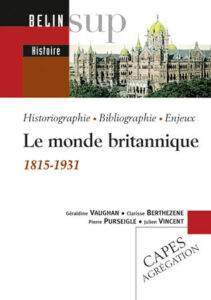
Le monde britannique (1815-1931)
Historiographie, bibliographie, enjeux
Publication | Critiques
Résumé
À mesure que la décolonisation avançait, la recherche historique portant sur le monde britannique n’a cessé de s’enrichir. Profondément renouvelée par les études postcoloniales à la fin des années 1970, la nouvelle historiographie britannique propose une approche transnationale et des regards croisés englobant histoire intérieure des îles britanniques et histoire coloniale. De la fin des guerres napoléoniennes (1815) à l’adoption du Statut de Westminster et la dévaluation de la livre sterling (1931), le monde britannique se redéfinit et se déploie suivant des axes économiques, politiques, militaires, religieux et culturels.
Cet ouvrage présente d’abord les différentes approches historiographiques de la question et propose une sélection commentée des travaux portant sur l’histoire du monde britannique. Il s’attache ensuite à examiner les principaux enjeux du sujet : les forces économiques à l’œuvre ; les migrations au sein de l’espace impérial ; la question de la pax britannica et des guerres ; les espaces urbains et la citoyenneté, ainsi que la construction des savoirs.
Critiques
- “This important volume from an authoritative international team of authors sheds significant new light on the comparative development of post-war Conservatism in the western world.”
– Stuart Ball, Professor Emeritus, University of Leicester, UK - “The rich essays collected in this illuminating volume show that the rise of right-wing politics in the United Kingdom, the United States, and France since the 1970s was a remarkably transnational phenomenon. As they attacked social democracy and cultural pluralism, right-wing movements borrowed ideas, visions, vocabularies, and tactics from each other, adapting them to their own national idioms and using advances in one country to win advances elsewhere. Anyone interested in confronting the problems that have proliferated in the wake the right’s reconfiguration of politics – surging inequality, belligerent ethno-nationalism, worker disempowerment and insecurity, and lost faith in the capacity for democratic self-government – has much to learn about the origins of these problems from this important book.”
– Joseph A. McCartin, Georgetown University, USA, author of Collision Course
